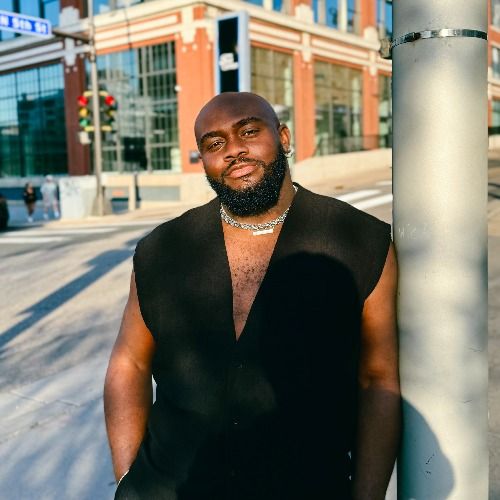An Introduction to Odejuma
In the first episode of Odejuma, Harry dives into the incredible power of storytelling. He highlights the stories of everyday people and how they can spread hope and resilience. Drawing inspiration from his Nigerian roots, Harry shares his journey from being a young media enthusiast to becoming a passionate journalist dedicated to uplifting marginalized voices, leading him to start The Rustin Times, a media platform dedicated to shifting the narrative around queer folks in Africa and the diaspora.
The podcast title, Odejuma, comes from the Itsekiri language and means 'till tomorrow,' which perfectly captures a hopeful perspective on the continuity of our human experiences. Listeners can look forward to engaging conversations with various guests while exploring themes like love, identity, and personal transformation. Odejuma celebrates resilience and invites everyone to acknowledge the importance of their stories in a world that truly needs them.
You can watch Defiance here: Defiance: Voices of a New Generation | Nigerian LGBT+ Documentary
Transcript
Hey, I'm Harry Itie, and welcome to the very first episode of Odejuma.
inute, which I did from, like:And I know everyone has a podcast now, and yeah, I have one. So here I am with Odejuma. Now, Odejuma directly translates to till tomorrow in Itsekiri, which is a tribe that I belong to.
It's a tribe from Nigeria, and it is a way the Itsekiri people say good night. But for this podcast, it means something a little bit different. This podcast is built on a simple but very powerful idea.
That the stories from everyday people matter and also gives hope that our lives, with all the beauty, messiness, wins, losses, and in betweens deserves to be seen and heard. That these stories can be a source of inspiration and hope for better days ahead. And that there is power in the stories of everyday people.
And these stories are worth telling. Now, I've spent most of my life asking people questions as a journalist, content creator, comms professional and community advocate.
But today, for this first episode, I want to do something different. I want to start here with me, with my story.
Because before we go on this journey of storytelling together and before we hear from all the incredible folks that will be featured on this podcast, I only think it's right that I share my story and why this matters to me and how I got here. So I was born and raised in Nigeria. We were not a rich family, but my mother made sure we didn't lack anything.
I grew up around a lot of family, like uncles, aunties, cousins. And because I was the youngest, I got a chance to hang out with the grownups on most days. Also, being the youngest, you don't have.
You don't really have, like, you know, people around your age to play with. So it kind of expanded my imagination and my love for stories and for people. To my dad, God rest his soul, kick started my love for books.
And he introduced me to many stories, right? So from, like, I know there was like the first book he bought for me, I think it was like the Muppets had, like a storybook version.
There was a Sesame Street book that he bought for me.
And then as I got older, all the Scholastic books I had from, like, Goosebumps, Babysitter's Club, Fear Street and then I joined a book club that he helped me sign up for when I was like a teenager. And then I was reading a lot of Sweet Valley High, Sweet Valley University. It was a Sweet Valley situation. So that was, that was that.
But I remember that he also helped me write my first book on his computer when I was 6. And I don't remember, I don't remember what the book was about, but I know he printed it out bounded in a yellow cover.
And I just don't know where that book is. Maybe it's among these things. I don't know. I would love to see it. But yeah, that was like how my dad kind of like inspired my love for like stories.
But my mom was who kind of inspired me to be a journalist because she was also a journalist and she loved her work so much, right? And I would be so amazed when I looked at her and how she would do her job. But my mom didn't want me to be a journalist.
She was like, journalism doesn't pay, you're gonna be broke. And she wasn't wrong. Journalism doesn't pay. But I wasn't changing my mind because I really wanted to do what she was doing.
I remember being a young kid and I would get the newspaper and I would go on the dining table and I would read like I'm, you know, the news anchor for the news. It was such a, it was such a vibe, right? So that was like what I spent my childhood doing.
So I went to school, studied mass communication, got out and became a journalist, hosted entertainment shows, interviewed celebrities, did some general lifestyle reporting. When I was in the BBC, I reported on everything. Like I didn't have a beat. I was a general reporter, traveled, went to all the cool events.
But as a coming up and growing up as a queer person who was living in Nigeria, a country that has like three anti gay laws, I realized that, you know, I needed to tell different stories, right? A lot of the stories that were important to us as queer folks were not making it past the editors in the newsroom.
Especially if it was a mainstream Nigerian television station or Nigerian platform, you know what I'm saying?
If it was going to be like a regular blog, you know, they would put out the stories and they will sensationalize the stories and we didn't really want that, right. Our stories felt very important, especially with all the misinformation that was being shared around queer folks in the country.
Something has to give. So I created the Rustin Times and it was inspired by the life of Bayard Rustin Right.
I started the rustin times in:And I got a chance to direct my first documentary, Defiance, which is currently on YouTube. So if you want to watch that, I can link it in the description.
And it was such a huge win for me because I had been wanting to make space for LGBTQ Nigerians to be visible. Right. And at the time, a lot of folks weren't like, speaking out openly about their sexuality.
It was such a huge moment and I'm glad that I was a part of that. I am very thankful that my work has taken me around the world and has given me like a global lens through which I understand people better.
I feel like my life experiences have prepared me for this moment as a 30 something year old queer black man living in the US specifically in the Twin Cities, and is still fascinated by the magic of a good story. And the thing about a good story is it doesn't have to be anything grand, right?
It could be the one that your mom told you about, the uncle you never met, or the one your colleague will share about their college roommate. It could be the one you read on Instagram that shifts your entire outlook on life.
Or an interview from your favorite singer about how they managed through a hard time.
And that is why I started this podcast, because I had forgotten about the power in the ordinary and the stories from friends that have us laughing from the depths of our bellies.
I wanted to remind us, and remind me actually that we are unforgettable, you know, and our stories might be the thing that someone will hear and give them joy or spark a creativity that they didn't know was hitting. So here's what to expect if you're joining me on this journey.
Every week I will sit down with someone, maybe a nurse, a teacher, a cab driver, a dancer, an activist, a grandmother, a friend. And we are going to just talk. We'll talk about life, about love, about work, culture, joy, loss, identity, transformation.
Some of it will be light and funny. Some of it will hit you in the chest. But all of it will be very real. I really hope you join me on this ride and listen to this podcast when you can.
I hope you will subscribe, leave a review and share with your people. I hope this podcast reminds you of your own resilience and your own wonder.
And I hope it gives you permission to share your story, too, because someone, somewhere needs to hear it. I appreciate you getting to the end of this episode with me. And I can't wait to catch you on the next one, Odejuma.


